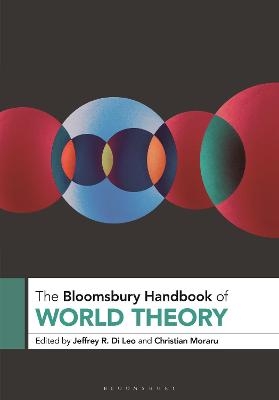
The Bloomsbury Handbook of World Theory
Bloomsbury Academic USA (Verlag)
978-1-5013-6194-4 (ISBN)
The Bloomsbury Handbook of World Theory examines what “world” means and what it accomplishes in different zones of academic study. The contributors raise questions such as: What happens when “world” is appended to a particular form of humanistic or scientific inquiry? How exactly does “worlding” bear on the theoretical operating system and the history of that field? What is the theory or theoretical model that allows “world” to function in a meaningful way in coordination with that knowledge domain?
With contributions from 38 leading theorists from a vast range of fields, including queer studies, religion, and pop culture, this is the first large reference work to consider the profound effect, both within and outside the academy, of the worlding of discourse in the 21st century.
Jeffrey R. Di Leo is Professor of English and Philosophy at the University of Houston-Victoria, USA. He is Editor of the American Book Review, Founding Editor of the journal symploke, and Executive Director of the Society for Critical Exchange and its Winter Theory Institute. His recent publications includeThe End of American Literature: Essays from the Late Age of Print (2019), The Bloomsbury Handbook of Literary and Cultural Theory (Bloomsbury, 2019), What’s Wrong with Antitheory? (Bloomsbury, 2020), Philosophy as World Literature (Bloomsbury, 2020), and Vinyl Theory (2020). Christian Moraru is Class of 1949 Distinguished Professor in the Humanities and Professor of English at University of North Carolina, Greensboro, USA. His recent publications include Cosmodernism: American Narrative, Late Globalization, and the New Cultural Imaginary (2011), Reading for the Planet: Toward a Geomethodology (2015), and Romanian Literature as World Literature (Bloomsbury, 2018).
Preface and Acknowledgements
Jeffrey R. Di Leo (University of Houston, Victoria, USA) and Christian Moraru (University of North Carolina, Greensboro, USA)
Notes on Contributors
Introduction: World Theory in the New Millennium
Jeffrey R. Di Leo (University of Houston, Victoria, USA) and Christian Moraru (University of North Carolina, Greensboro, USA)
Part 1: Arts and Humanities
1. Worlding History
Fabio López-Lázaro (University of Hawaii, Manoa, USA)
2. Worlding Philosophy
Brian O’Keeffe (Barnard College, USA)
3. Worlding Ethics
Nigel Dower (University of Aberdeen, UK)
4. Worlding Art
Nikos Papastergiadis (University of Melbourne, Australia)
5. Worlding Postmodernism
Hans Bertens (Utrecht University, Netherlands)
6. Worlding Comparative Literature
Christian Moraru (University of North Carolina, Greensboro, USA)
7. Worlding Popular Culture
Esther Peeren (University of Amsterdam, Netherlands)
8. Worlding Music
John Mowitt (University of Leeds, UK)
9. Worlding Cinema
Alex Taek-Gwang Lee (Kyung Hee University, Korea)
10. Worlding Theater
Gina MacKenzie (Holy Family University, USA)
11. Worlding Religion
Gerda Heck (American University of Cairo, Egypt) and Stephan Lanz (Europa-Universität Viadrina, Germany)
Part 2: Social and Behavioral Sciences
12. Worlding Sociology
Veronika Wittmann (Johannes Kepler University Linz, Austria)
13. Worlding Anthropology
Nigel Rapport (University of St. Andrews, UK)
14. Worlding Economics
Peter Hitchcock (City University of New York, USA)
15. Worlding Psychoanalysis
Dany Nobus (Brunel University, UK)
16. Worlding Women
Robin Goodman (Florida State University, USA)
17. Worlding Gender
Vrushali Patil (Florida International University, USA)
18. Worlding Queer
Sri Craven (Portland State University, USA)
19. Worlding Identity
Zahi Zalloua (Whitman College, USA)
Part 3: The Professions
20. Worlding Higher Education
Michael Thomas (Liverpool John Moore University, UK)
21. Worlding Public Policy
Kenneth J. Saltman (University of Illinois, Chicago, USA)
22. Worlding International Education
Lien Pham (University of Technology Sydney, Australia)
23. Worlding International Relations
Sophia McClennen (Penn State University, USA)
24. Worlding Media Studies
Toby Miller (Loughborough University London, UK) and Jesús Arroyave (Universidad del Norte, Colombia)
25. Worlding Journalism
Vera Slavtcheva-Petkova (University of Liverpool, UK)
26. Worlding Publishing
Jeffrey R. Di Leo (University of Houston, Victoria, USA)
27. Worlding Architecture
Richard Ingersoll (Politecnico de Milano, Italy)
Part 4: Natural and Formal Sciences
28. Worlding Logic
Paul Livingston (University of New Mexico, USA)
29. Worlding Spatiality Studies
Robert T. Tally Jr. (Texas State University, USA)
30. Worlding Cybernetics
Andrew Culp (California Institute for the Arts, USA)
31. Worlding Systems Theory
Bruce Clarke (Texas Tech University, USA)
32. Worlding Biology
Adam Nocek (Arizona State University, USA)
33. Worlding Environmental Studies
Robert P. Marzec (Purdue University, USA)
34. Worlding Earth and Climate Studies
Claire Colebrook (Penn State University, USA)
Index
| Erscheinungsdatum | 11.03.2022 |
|---|---|
| Reihe/Serie | Bloomsbury Handbooks |
| Verlagsort | New York |
| Sprache | englisch |
| Maße | 178 x 254 mm |
| Themenwelt | Geisteswissenschaften ► Sprach- / Literaturwissenschaft ► Anglistik / Amerikanistik |
| Geisteswissenschaften ► Sprach- / Literaturwissenschaft ► Literaturwissenschaft | |
| Naturwissenschaften ► Biologie ► Ökologie / Naturschutz | |
| ISBN-10 | 1-5013-6194-5 / 1501361945 |
| ISBN-13 | 978-1-5013-6194-4 / 9781501361944 |
| Zustand | Neuware |
| Haben Sie eine Frage zum Produkt? |
aus dem Bereich


